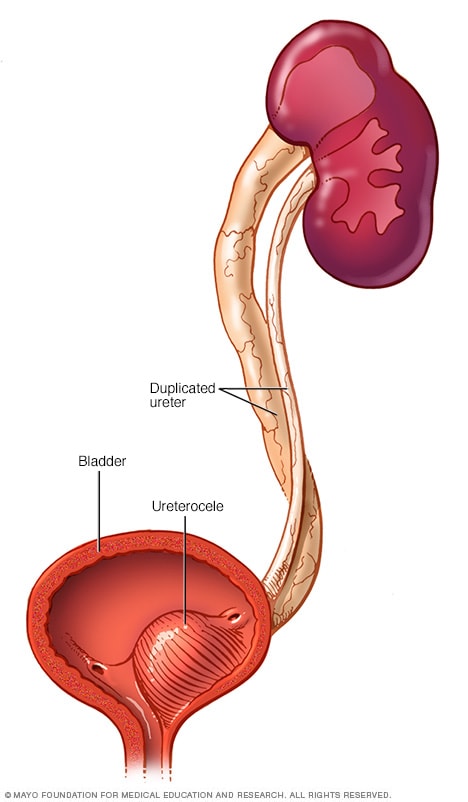A ureteral obstruction is a blockage in one or both of the tubes (ureters) that carry urine from the kidneys to the bladder. Ureteral obstruction can be cured. However, if it's not treated, symptoms can quickly move from mild — pain, fever and infection — to severe — loss of kidney function, sepsis and death.

Ureteral obstruction is fairly common. Because it's treatable, severe complications are rare.
Symptoms
Ureteral obstruction might have no signs or symptoms. Signs and symptoms depend on where the obstruction occurs, whether it's partial or complete, how quickly it develops, and whether it affects one or both kidneys.
Signs and symptoms might include:
- Pain
- Changes in how much urine you produce (urine output)
- Difficulty urinating
- Blood in the urine
- Urinary tract infections
- High blood pressure (hypertension)
When to see a doctor
Make an appointment with your health care provider if you have signs and symptoms that worry you.
Seek medical attention if you experience:
- Pain so severe that you can't sit still or find a comfortable position
- Pain accompanied by nausea and vomiting
- Pain accompanied by fever and chills
- Blood in your urine
- Difficulty passing urine
Causes
Different types of ureteral obstruction have different causes, some of them present at birth (congenital). They include:
- A second (duplicated) ureter. This common condition, which is congenital, causes two ureters to form on the same kidney. The second ureter can be fully or only partially developed. If either ureter doesn't work properly, urine can back up into the kidney and cause damage.
- A blockage (obstruction) where the ureter connects to the kidney or bladder. This prevents urine flow. A blockage where the ureter and kidney meet (ureteropelvic junction) may cause the kidney to swell and eventually stop working. This condition can be congenital or can develop with typical childhood growth, result from an injury or scarring, or in rare cases, develop from a tumor. A blockage where the ureter and bladder meet (ureterovesical junction) may cause urine to back up into the kidneys.
- Ureterocele. If a ureter is too narrow and doesn't allow urine to flow completely, a tiny bulge in the ureter (ureterocele) may develop. When a ureterocele develops, it's usually in the section of the ureter closest to the bladder. This can block urine flow and cause urine to back up into the kidney, possibly leading to kidney damage.
- Retroperitoneal fibrosis. This rare disorder occurs when fibrous tissue grows in the area behind the abdomen. The fibers may grow as the result of cancer tumors or from taking certain medicines used to treat migraines. The fibers encircle and block the ureters, causing urine to back up into the kidneys.
Other possible causes
Various causes inside (intrinsic) or outside (extrinsic) the ureter can lead to ureteral obstruction, including:
- Kidney stones
- Cancerous and noncancerous tumors
- Blood clots
- Enlarged lymph nodes
- Internal tissue growth, such as endometriosis in females
- Long-term swelling of the ureter wall, usually due to diseases such as tuberculosis or a parasite infection called schistosomiasis
Complications
Ureteral obstruction can lead to urinary tract infections and kidney damage, which can be irreversible.
